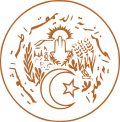History
In 1961, with a fake Ethiopian passport, Nelson Mandela traveled to Algeria where he was trained by the armed forces of the Algerian National Liberation Front (FLN). In his book Long Walk to Freedom , he reveals his struggle against the apartheid was greatly inspired by the struggle of the Algerian soldiers. The FLN then provided the African National Congress with weapons. Returning to Algiers in 1990, Mandela declared «The Algerian army made me a man». Algeria was the first country visited by Mandela after his release. [3] [4]
In November 1964, the University of Algiers conferred an honorary Doctorate of Literature to South African activist Albert Lutuli. [5]
In 1974, in support to the anti-apartheid movement, the Minister of Foreign Affairs of Algeria Abdelaziz Bouteflika successfully lobbied for the expulsion of the South Africa representation from the United Nations General Assembly that he presided that year. [6] He successfully argued that South Africa's delegates were invalid because they represented only a white minority. [7]
An ANC-backer, Algeria bought weapons and surveillance equipment from South Africa (for over $15 million in 1997, $51.3 million in 1999, SA's top client that year) to fight its own Civil War. [8] In November 1997, the South African Embassy was established in Algiers. [1] The Algerian-South African High Binational Commission for Cooperation (HCBNC) was created in September 2000. [6]
This page is based on this
Wikipedia article Text is available under the
CC BY-SA 4.0 license; additional terms may apply.
Images, videos and audio are available under their respective licenses.

